We have often derived instruction as well as amusement from the study of the varied types of Masonic character which we have met in the course of a long and chequered experience.
– Another example that demonstrates that nothing really changes in Freemasonry. In an article the Types of Masonic Character published 145 years ago in The Freemason’s Chronicle 10th April, 1875
The study of men indeed is always valuable mental discipline, but as we advance in life it becomes a positive pleasure to note the idiosyncrasies of those around us.
Books do not always retain their power to charm, and he who has been the greatest reader in his youth, frequently finds that his library is little or no solace to him in his later years.
But the great book of humanity has an intense fascination for us all.
He who has learned to read men gets his knowledge at first hand, and is in no need of the laboured reflections of the essayist or the feeble attempts at character sketching which abound in modern works of fiction.
An elderly man, who knows his Shakespeare, and who looks about him with his own eyes, is sure to see much that is of the greatest value which escapes the vision of those who have never trained themselves in the art of reading mankind.
Our Lodge meetings afford ample scope for studies of this description, and for our own part we would rather read Masons than any other section of the genus homo.
The brethren have their little foibles like other people.
We, indeed, have ours, which, no doubt, are conspicuous enough to keen sighted persons, who wag their heads, and hint that so and so is a good fellow, but he has his weak points, and then follows a summary of the joints in our harness, which are no doubt numerous enough.
We never object to criticism of this kind provided it is not malicious ; our own remarks in this paper, and the articles which may follow it, are prompted by the greatest good feeling.
We do not seek to wound, but merely to amuse, or perhaps instruct our readers, who, possibly, may at once admit the truth of the rough and vague outlines of character which we shall sketch for them.
First of all let us notice that Masonic hero who always catches a novice by the button hole and proclaims the marvellous fact, for the hundredth time, that he has been a Mason for twenty years, and has never missed a Lodge meeting.
He is an admirable person; the sort of man upon whose attendance a Master of a Lodge can always rely; whatever the condition of the weather may be he is sure to turn up.
His familiar face is one of the institutions, so to speak, of the Lodge.
You would miss it as much as the familiar bust or picture which greets your eye the moment you enter the sacred precincts.
He is versed in Masonic law this regular attendant; and carries in his mind an unbroken tradition of the Lodge history.
If he were to miss a single meeting he would lose, he tells you, the thread of the business, and could not readily tell us in what portion of the records a particular fact could be found.
As a walking index, and a more or less sound legal adviser he is useful, and although the cynics say that he has never done anything for the Order, we are prepared to assert that his humble contributions to Masonic prosperity are not to be despised.
A man whose very presence is almost sufficient to keep the Lodge warm is at all events a negatively good Mason.
He is never an absentee, he is never in arrear, he never gets out of order.
Some virtues of the positive type would possibly serve to sweeten his character, but all men are not born with genius or endowed with the desire to leave the world better than they found it.
Our punctilious Mason is a good fellow in his way, and we gladly leave him in quiet enjoyment of the glory which may be squeezed out of his regular habits and his deep interest in the mere letter of the Craft.
Another type of Mason, whose doings have sorely exercised us, is the man who rushes eagerly after office, but who has not talent enough to fill the post of honour with credit to himself or advantage to the Order.
He is one of your dunder-headed men, and can never acquire a perfect knowledge of his duties.
He breaks down lamentably in ceremonial sometimes on critical and solemn occasions.
Or in moments when a brilliant flash of genius lights up his mind, and he is disposed to rush glibly along the well-beaten road, some wag puts in an “aside,” and the confident hero tumbles at once from high heaven to the nether hades.
He is commonly a solemn sort of person, and when he speaks you imagine that he is extracting his words from some deep internal reservoir.
You scarcely see any movement of the lips, but his low grumbling tones assure you that the machinery of his mind works through the agency of an intricate arrangement of cogwheels.
With all his faults, however, we like him much better than we do those brethren who readily catch the letter of Masonry, but never acquire its spirit; whose learning is no deeper than the lips, and who pour out, parrot-like, their superficial acquirements.
Such men are apt to leave a disagreeable impression on the minds of thoughtful young Masons, who leave their glibe mentors with the idea that Masonry after all is a thing of books and formulas, and not a set of principles which admit of infinite development.
Further knowledge of Lodge proceedings soon, no doubt, removes this erroneous impression, but it would be better if it had never been produced.
High qualifications for office are, no doubt, rare, but respectable mediocrity is, or should be, common enough, and great care should be exercised in the choice of brethren to fill prominent positions.
If the officers are below par the Lodge suffers in prestige, and consequently in prosperity.
The enthusiastic Mason, whose enthusiasm is like the froth of ginger beer, is not a favourite with us.
We value and appreciate enthusiasm of the true sort whenever we meet with it.
It is a moral force of the most powerful and subtle kind, and those who possess it have done wonders for the cause.
But our obnoxious enthusiast is all froth; there is no noble liquor under his creamy head.
He takes to this or that subject as the fit seizes him, and never works long enough at any to make a lasting impression.
His oratory is of the effervescent kind, and he deals naturally in well-worn platitudes, which have served again and again to give a dull point to still duller wit.
He, however, rapidly reaches his climax.
Some rough, but kindly brother, endowed with a strong tincture of common sense, gives him his first rebuff, and our frothy enthusiast at once sinks into a state of collapse, and disappears for a time from the scene of his labours.
He now attends but seldom, and remains a dumb listener for life.
Having never learned the English habit of giving and taking, he cannot feel any charity for the brother who so rudely set him down, but continues to cherish a small animosity, which is decidedly unmasonic.
Of course, he would not do his supposed enemy any harm for the world.
But he never applauds his sensible remarks, and votes against him on every occasion.
He has had his coup de grâce, but can neither die like a Briton, nor get thoroughly healed of the wound.
His silence is, however, a decided gain to his Lodge, if he could only be brought to think so; since it is very certain that no institution has ever yet gained any permanent good from noise and froth.
The Mason who never will accept the decision of the majority, is of a type which may occasionally be met within most Lodges.
He has not learned the most elementary principles of the art of governing, and fancies that his own inclinations should constitute the only law that should control his conduct.
He is the sort of man who will divide again and again upon a motion which must inevitably be carried, and he will do this as long as it is possible to couch amendments in fresh language.
He loves fiction, and is always sure, even when he is opposed by a host, that he must be right.
The odd thing about him is that he is never, except by accident, on the side of the majority.
If a wrong view of any question is possible he is sure to take it, and he consoles himself for his failure by the trite reflection, that men of genius are always in advance of the age in which they live.
He plumes himself upon being a thinker, upon taking profound and philosophical views of questions which are submitted to his judgment.
He is always sailing in the clouds, and he evolves his philosophy as well as his reasons from his inner consciousness.
Nothing can be right that he dislikes, nothing can be wrong that he loves.
He is always a bore, but, perhaps, for pure boredom, he is surpassed by the brother who does not possess two ideas to rattle against each other in his vacant upper story, but who insists upon taking part in every debate.
This gentlemen never expresses an original opinion, and his speeches are always rehashes of the views of the speakers who have preceded him.
He invariably rises late in the discussion, and then gives a masterly summary of the ideas of others.
The brethren dread his monotonous drone, but he is not to be put down by any of the artifices which are usually employed by impatient hearers to cut short a prosy speaker.
The drumming of impatient feet upon the floor only serves as a sweet and appropriate accompaniment to his dull flow of talk, and when he has finished he sits down with the air of a man who has added important thoughts to the stock of information before the Lodge.
He, however, gives way like an Englishman to the will of the majority, and accepts its decisions with perfect loyalty.
Such a man, if he knew the virtue of silence, might be a valuable addition to the strength of the Order.
He is usually a good Mason, punctual in the performance of his duties, ready with his purse, and a good worker.
His speeches are, however-, trying in the extreme, and it is marvellous that he can find men patient enough to swallow such an “intolerable deal of sack,” which is never tempered by anything solid.
If he could hold his tongue he might pass for a wise man, but the unruly member tells the story of his mental vacuity, and every one votes him a bore.
Our ideal type of a Mason is the man who, although not a constant attendant at Lodge, yet contrives, by his wisdom and personal worth, to carry enormous weight in its councils.
His proposals are always carried, and his speeches are characterised by a quiet dignity and grace” which gives them a peculiar charm.
When he rises to address the brethren you may hear a pin drop, and he concludes his pithy orations amid general regrets that he has said so little.
Yet he possesses the rare art of saying much in a few words, and has thoroughly learned how to influence the minds of thoughtful men.
He never deals in flights of oratory, or in that species of bunkum which passes for eloquence, but carries his point by the aid of well arranged facts and cogent reasoning.
A man of this stamp is always a pillar of the Lodge which is so fortunate as to claim him as a member.
He would, probably, shine in any station in life, and is as highly respected in the city for his probity and good judgment as he is in the Order for his studious regard for the true interests of Masonry.
Lastly, we must touch briefly upon the characteristics of the Mason who is conspicuous for benevolence.
Happily, this type is common enough, but we have in our minds eye, as the most perfect embodiment of the character, the brother who seldom makes speeches, but who works silently and steadily at the task he has set himself.
We shall not chronicle the long roll of his good deeds, since a man of this stamp generally does good by stealth, yet when duty calls him to a prominent place, and he becomes one of the Stewards of the annual banquet in aid of the funds of the Asylum or Schools, he is always conspicuous for the large sum which he manages to collect for the Institutions.
But his goodness is never one-sided, and he always remembers that true charity begins at home.
His first care is for his wife and family, his second is for the Order, and his last for the world.
When such a man dies, here quires neither panegyric nor epitaph.
The good he has done lives after him, and is the most fitting monument of his fame.
 The Freemasons Chronicle, a weekly record of masonic intelligence, was first published 2nd January 1875 London, England as an independent weekly journal of masonic interest and continued for 27 years.
The Freemasons Chronicle, a weekly record of masonic intelligence, was first published 2nd January 1875 London, England as an independent weekly journal of masonic interest and continued for 27 years.
It should be the business of a journal devoted to the interests of the Order to attempt the removal of prejudices such as these, which, though they may have little perceptible influence upon the prosperity of the Fraternity, yet have the effect of preventing timid or ill-informed persons from enlisting under its banner.
It will not only attempt to keep pace with the growing literary requirements of the day, but it will seek to exhibit the Order to the non-Masonic world divested of its technical details, and clothed in the garb of Charity and Brotherly Love.
The questions of the hour, which exercise the minds of thoughtful men, will be handled freely and broadly, without any tinge of political or sectarian bias.
The memoranda of Masonic gatherings which will appear from week to week, will be full and accurate; and as free interchange of opinion is one of the best signs of life and vigour in any society, ample scope will be given for Correspondence on topics of interest to the Order.
If we may venture upon a new rendering of words which recent events have made memorable, we will say here, once and for all, that we will be keen men of business, and will spare no effort, consistent with honour, to achieve commercial success; but first, and before all things, we will prove to our brethren and the world that we are FREEMASONS.
Recent Articles: The Freemason's Chronicle
 Operative And Speculative Masonry Explore the fascinating transition from Operative to Speculative Masonry in our latest post. Discover historical insights from Augustus C. L. Arnold and Rev. Wm. P. Strickland, shedding light on Freemasonry's evolution and its enduring principles. Dive into the rich history and significant milestones that shaped modern Freemasonry. - The Freemason's Chronicle - 2 September 1876 |
 Discover the true essence of Freemasonry, an ancient order founded on the profound principles of love for God and man. It's a call to rise above mere appearances, to embody genuine virtue and benevolence, transcending societal pretense. Embrace the transformative power of simplicity, and let the authentic glories of Freemasonry inspire your path. |
 Discover the intriguing story of a man who became a Mason but openly professed his dislike for the institution. Unravel the peculiar circumstances that led him down this path and explore the unexpected consequences that followed. Dive into this thought-provoking account that challenges our notions of loyalty and reveals the complexities of human nature within the Masonic fraternity. |
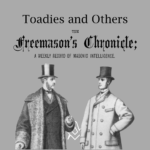 In the realm of Masonry, the principles of equality and respect are paramount. Yet, the presence of toadies—those who obsequiously seek favour from the influential—threatens these ideals. While Masonry embraces diverse beliefs and backgrounds, it rejects the sycophantic behaviours of toadies, flunkeys, and tuft-hunters, urging members to uphold genuine respect and self-worth. The Freemason's Chronicle - 22nd January 1876 |
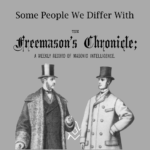 Unveiling the Unpleasant: Some People We Differ With Discover the intriguing dynamics of quarrels within the Masonic brotherhood. From the cantankerous to the litigious, the peevish to the vengeful, delve into the characters that challenge fraternal harmony. Explore their motives, temperaments, and the art of navigating disputes with these fascinating brethren. Brace yourself for a riveting journey into the world of conflicting personalities. |
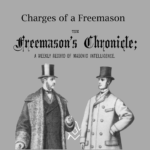 Unravelling the Masonic Mystique: A Deep Dive into the Freemasons' Charges - Explore the intricate world of Freemasonry, its principles, rituals, and the mechanisms for resolving internal disputes. Discover how this ancient fraternity fosters unity, promotes moral conduct, and upholds the sanctity of its secrets, while navigating the complexities of modern society. - The Freemason's Chronicle - 4 December 1875 |
 Unlock the hidden lessons of Masonic Studies! Don't settle for superficial knowledge or mere rituals. Discover the true depth and meaning behind Freemasonry. Expand your understanding of Tracing-Boards, Lectures, and more. Join regular Lodges of Instruction to enhance your Masonic journey. Become a knowledgeable Freemason, not just a token-bearer. Unleash the power of true Masonic wisdom today! |
 Uncover the incredible story of how Masonry saved the life of a Crimean War foot soldier in this historical and masonic account. Through the first hand experience of a soldier engaged in fierce hand-to-hand combat, witness the fateful encounter with a Russian Freemason that changed the course of his life. Learn how brotherhood and a deep dedication to the craft can lead to unforeseen and life-saving circumstances on the battlefield. |
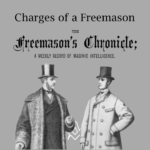 The Freemason's Chronicle - Charges of a Freemason The secrets of Masonry are the exclusive property of the Craft, and can never be communicated to one who is a mere labourer and not an accepted Mason. Hence, no labourer, that is, one who has not been regularly initiated in a legal Lodge. Article first published in The Freemason's Chronicle, 27 November 1875 |
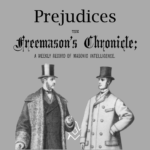 The Freemason's Chronicle - Prejudices Prejudices are partial judgments in favour of, or against certain persons or things, and, for convenience sake, may be ranged in two categories—those which are, comparatively speaking, harmless, and those which are harmful. Article first published in The Freemason's Chronicle, Oct. 2 1875. |
 The Freemason's Chronicle - Cliques Is Freemasonry - a Clique ? Man has been defined as a gregarious animal, but in his highly civilised condition he is gregarious only to a limited extent. First published in The Freemason's Chronicle, Oct. 2 1875, addresses the same challenges then as now. |
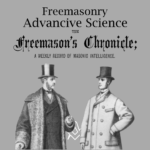 The Freemason's Chronicle - Freemasonry - an Advancive Science Is Freemasonry - an Advancive Science ? Not to confuse advancement with innovation. Has it been the case that Freemasonry's survival for 300 years plus is due to being an Advancive Science, tending to advance. First published in The Freemason's Chronicle 18 September 1875, addresses the same challenges then as now. |
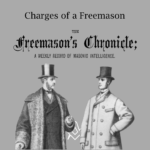 The Freemason's Chronicle - Charges Of A Freemason An interpretation of the "Charges of a Freemason", written Bro. Cornelius Moore and published in 1875, that introduce certain opinions that for some readers, will not sit well in contemporary times. - The Freemason's Chronicle, Sept. 11, 1875 |
 On The Order Of The Temple And Its Doctrine. THE Order of the Temple is divided into two great classes, denominated respectively the Order of the Temple and the Eastern Order. The Eastern Order gave birth to the Order of the Temple, and in the course of time has become an appendage of the latter. It is in ancient Egypt that we find the cradle of the Eastern Order. The Freemason's Chronicle, Sept. 4, 1875 |
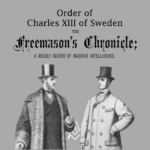 Order of Charles XIII of Sweden The following translation of the Manifesto of King JL Charles XIII of Sweden, on the occasion of his establishing the Masonic Order which bears his name, and of the Statutes of the said Order, may be interesting to our readers. The Freemason's Chronicle, Aug. 28, 1875 |
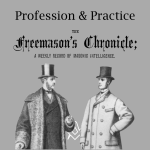 Most of our readers in the course of their experience, have doubtless met with enthusiastic brethren who take it for granted that a Mason can do no wrong. These enthusiasts are thoroughly convinced that the vast majority of those who join the Order are the most benevolent, the most moral, and the very noblest members of society. - The Freemason's Chronicle 10 July 1875 |
 An article investigating the relationship between masonry and citizenship. Are the principles of Freemasonry aligned with the freemason's claim to be a better citizen of the world? The Freemason's Chronicle - 19 June 1875 |
 A visitor must make clear his identity to the satisfaction of the Lodge he proposes to visit. More than once have we been asked to explain our views as to the reception of strangers in a Lodge. - The Freemason's Chronicle - 29 May 1875 |
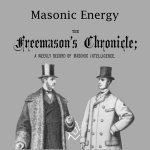 Is there reason in the accusation that Masonic energy looks only to a course of good feeds, when we can point to such grand results as have been achieved in these latter years, both in respect of the extension of our Order ? - 1May 1875 |
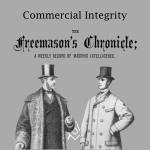 Implementing Freemasonry's peculiar system of morality in our day to day business affairs was the topic of this article, Commercial Integrity, first published in The Freemason's Chronicle - 8 May 1875 |
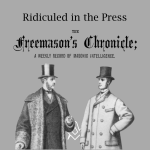 Ridicule has been somewhat illogically described as the test of truth. If it were so, Freemasonry ought to have perished long since. Two press reports from May 1875 covering the |
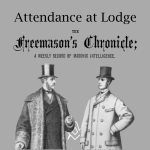 There are many things which Freemasonry will do for a man in the way of opening his mind and giving him larger and kindlier views of life, but Freemasonry itself, cannot eradicate the natural bias of the disposition. |
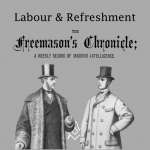 There is, we fear, too marked a tendency in very many Lodges to hasten through its labours, with a view to entering, as soon as possible, upon the business of refreshment. - The Freemason's Chronicle 17th April, 1875 |
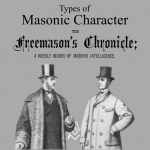 Another example that demonstrates that nothing really changes in Freemasonry. In an article the Types of Masonic Character published 145 years ago in The Freemason's Chronicle 10th April, 1875 |
 A brief history on the relationship between the British Monarchy and the craft - The Freemason's Chronicle 20th March , 1875 |
 What are the qualities of a convivial man and how does this dovetail perfectly in to Freemasonry ? 16th March, 1875 |
 A review of the "Sketch for the History of the Dionysian Artificers," a fragment, by Hyppoli to Joseph Da Costa - This little work may be regarded as, so to speak, the Holy Grail of Masonry. |
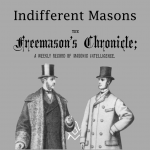 Nothing really changes, an article Indifferent Masons, From Le Monde Maçonnique 1874. Translation published in The Freemason's Chronicle 20th February, 1875 |
 In handling an intruder in the lodge, we endeavoured to show that a good Mason should be a gentleman, and a sincere man. The Freemason's Chronicle 20th February, 1875 |
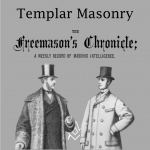 Templar Masonry - a historical aspect of the Religious and Military Order of the Temple published in The Freemason's Chronicle 13th February, 1875 |
 Secrecy perhaps the strongest objection urged by the enemies of the Masonic Order against its existence published in The Freemason's Chronicle 20th March 1875 |
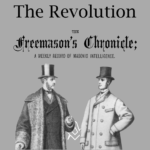 Freemasonry In The United States during And After The Revolution We take a look at Freemasonry in the United States during and after the Revolution first published in The Freemason's Chronicle - February 6, 1875 |
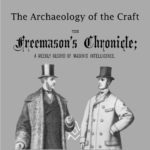 We take a look at the archaeological connection with the Craft, first published in The Freemason's Chronicle - January 30, 1875 |
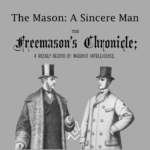 What it means to a Freemason to be a sincere man. Extract: first published in The Freemason's Chronicle - January 23, 1875 |
 What it means to a Freemason to be a citizen of the world ? First published in The Freemason's Chronicle - January 16, 1875 |
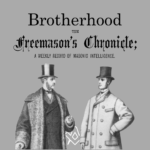 Brotherhood! In that one word what sympathetic associations arise. First published in The Freemason's Chronicle - January 9, 1875 |
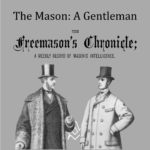 This opening article was written 145 years ago, yet it resonates with Freemasons today as it did then. First published in The Freemason's Chronicle, January 2, 1875, Issue 1 |
masonic knowledge
to be a better citizen of the world
share the square with two brothers

click image to open email app on mobile device








